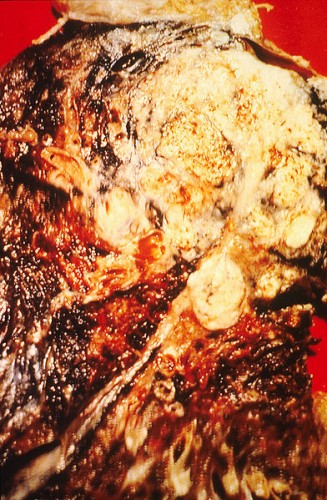The treatment developed in Israel may help patients who develop resistance to existing treatments

A new generation of drugs helps a large part of lung cancer patients, but often, after about a year, the drugs stop working due to the resistance that the cancer develops to the treatment. Researchers at the Weizmann Institute of Science, in collaboration with doctors from the Haim Sheba Medical Center (Tel Hashomer), overcame this resistance in mice using a new combination of existing drugs. The research findings were recently published in the scientific journal Clinical Cancer Research.
Lung cancer is the number one cause of death from malignant diseases. The new drugs on the market that treat subtypes of this cancer each focus on genetic mutations specific to each subtype. Approximately 12% of lung cancer patients, most of whom do not smoke, develop the malignant tumor due to a mutation in the gene called EGFR. This gene encodes a receptor that is on the cell membrane and protrudes from both sides: its "head", on the outside, binds to a growth hormone that transmits the command to the cell to grow, while its "legs", on the inside, act as enzymes (called "kinases") that pass the command on , to the cell nucleus. The EGFR command that causes the cell to divide usually serves a good purpose - for example, helping to heal tissues - but a mutation in the inner part of the receptor can cause the cell to divide unbridled, and cancer can form.
Patients carrying the EGFR mutation are successfully treated with drugs that are small molecules called "kinase inhibitors": they block the command that causes the cell to divide unbridled. These drugs benefit the patients much more than chemotherapy, because they are more effective, cause fewer side effects, and the patients receive them in a pill instead of an injection. The problem is that within 10 to 14 months, many patients develop another mutation in EGFR, which bypasses the "kinase inhibitors" and allows the recurrence of the disease in their body.
In 2015, after many years of development, a new "kinase inhibitor" was approved for use: the drug Tagrisso, which inhibits the second mutation. However, even in this case, 10 to 14 months later a third mutation or other changes will appear in the EGFR gene, which will allow the tumor to grow again. "This is of course a nightmare for the patients, the families and the doctors," says Prof. Yosef Yordan from the Department of Biological Control. "The new approach we developed, and successfully tested in mice, may ease the situation, if and when it is also successful in human trials."
In collaboration with doctors from the Haim Sheba Medical Center (Tel Hashomer), scientists in Prof. Jordan's group conducted an experiment on mice in which human lung cancer cells were transplanted. These mice were treated with a combination of Tabriso and the drug Erbitux - an antibody that blocks the EGFR receptor on the outside of the cell. This experiment was not successful, probably due to the "cunning" of the EGFR: when it is blocked on the surface of the cell, it "calls" its "relative", a receptor called HER2, to appear on the cell membrane. That's why the scientists conducted another experiment, this time with triple therapy, which included, in addition to Tagriso, two antibodies in one place: Erbitox, and the drug Herceptin, which blocks HER2.
This time the method worked. The tumors shrank and did not grow back as long as the mice received the triple treatment. The fact that all three drugs are already approved for use in humans against other types of cancer - Erbitox against colon cancer and Herceptin against breast cancer - will facilitate the implementation of the new approach in lung cancer patients in the future. "If our integrated method proves itself in human trials, it may help many thousands of lung cancer patients who are currently developing resistance to kinase inhibitors," says Prof. Jordan.
The research group included Dr. Donatella Romanello, Luigi Mazzao, Dr. Michael Mancini, Dr. Ilaria Marocco, Ashish Noronha, Matthieu Kreitman, Dr. Swati Srivastava, Dr. Soma Ghosh, and Dr. Moshit Lindzen from the Department of Biological Control, and Dr. Tomer Meir from the Department of Life Science Research Infrastructures. The institute's scientists collaborated with Dr. Amir On and Dr. Yair Bar from the Haim Sheba Medical Center (Tel Hashomer).
